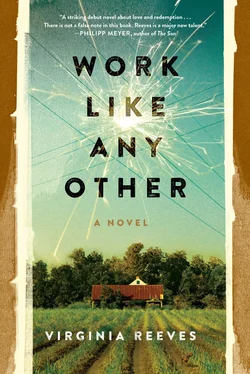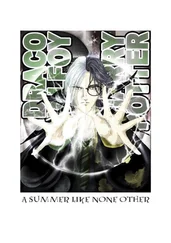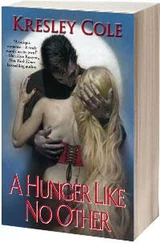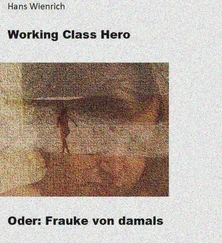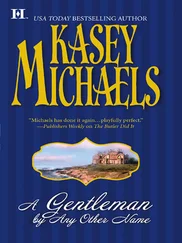“Well?” Taylor asks, and I must tell him that Dr. O. P. Bennett recommends stewed sheep and calf heads once the pups are born, macaroni, spaghetti, and any other noodles.
“Good Lord, Martin,” Taylor shouts. He’s taken to only shouting during Maggie’s pregnancy. “I don’t have any goddamned macaroni. What the hell do I do when the pups come ?”
“I haven’t found anything yet, sir.”
Taylor rubs his belly and looks at Maggie. “I paid a chunk for that stud, Martin. I have expectations of these pups.”
“I’ll keep looking.” I want Maggie’s pups to turn out as much as he does.
I take care of Maggie — bringing food and occupying her time. Taylor lets me walk her around the outside perimeter of the wall, all those guards watching, and I often wish young Marie would join us, barefoot and blue-dressed, her hair lighter from the regular days in the sun.
I see the excitement in you, she might say. You can’t wait for these puppies to come.
I nod, thinking those same thoughts, my eyes on Maggie’s growing belly.
DOGSdon’t take too long to grow inside their mothers. Sixty-two days, according to The Complete Book of the Dog . Around day sixty, we need to give her sloppy food and some salad oil.
Finally, I find a note about whelping for Taylor. “ ‘No help is necessary,’ ” I read to him, “ ‘and one may come down in the morning to find her with her litter comfortably nestling at her side.’ ”
“That’s as unhelpful as the damn noodles,” Taylor shouts. “What in the hell are you talking about, Martin?”
“It means Maggie’ll do just fine all on her own.”
Taylor looks out over his pack of dogs. Maggie lies near the north edge of her pen, barely the animal she was. Her stomach is a giant protrusion, spiked with her dropping nipples, and she waggles the way Marie did with Gerald.
“Is she close?” Taylor asks.
“By my count.”
“We best separate her, then.”
Her new pen has a shed in the back, a small protection from rain when it falls, built up on rough beams atop stone squares.
“She’ll go in there to have them,” Taylor says. “I’ll get us some old blankets from the laundry.”
But Maggie isn’t answering her master’s orders, now. Two days later, she’s nowhere to be seen, and only the mewling gives her away. She’s burrowed under the shed on the back side where we couldn’t see her digging. When I squat low to peer in, I can see the rise of her head and back, bony shoulders and haunches. The rest of her lies deep in a curved bed, dirt and wood obscuring her body and the puppies she must have birthed overnight. I can’t see even one of them, but they are noisy little things, bawling like kittens. Gerald sounded this way, only louder — bigger lungs and mouth.
“Hey there, girl,” I say to Maggie.
When I lie on my side on the ground, right up next to the rough wood, my good arm is just long enough to reach her head. There’s not room for my face under there, so I go by feel, trying to pet her, to give those dangling ears of hers a gentle tug. I’m wanting my hand to say, You’ve done good work, here. You are a good dog . I’m looking to comfort this new mother, to ease the terror she must be trembling under with all that need sucking at her belly.
“Martin! What in the hell you doing on the ground back there?”
My boots must be all Taylor can see, sticking out from the side of the shed, boots and ankles and dirty cuffs.
I run my fingers over Maggie’s head once more and pull my hand out.
“You hear that?” I ask, coming round.
Taylor tips his ear to his shoulder and squints. His hands rest on the wooden rail of the fence, and I can see the blood sucking from his knuckles with the force of his squeezing. He is always pushing the red out of some part of him, gathering it back to his massive heart, extra reserves for the next run.
“That the pups?” he asks, but he does not need an answer. His wide mouth pushes out into a smile I’ve never seen, and he releases the wooden rail in favor of a few flat-palmed slaps, a child’s joy in his hands and face. “How many are there? What’s the bitch-to-male count? What’s their color? All red like Maggie? Or some of that black and tan from the stud? They healthy? Any runts?”
“I’ve no idea, sir. She’s dug herself under the shed there. I haven’t gotten a look at the pups at all.”
The mirth leaves him quick as it came. “Now, why’d she do that, the damn dog? Those blankets are good enough for you men, and she’s turning her nose at ’em?” He lifts the sagging gate to get it clear of the dirt. The hinges are about done. I’m sure he’ll have me framing out a new one any day. “Where’s she at?”
I lead him round the back, and it’s a worry to see him crouching down. I keep as much a distance as I can, but I can’t close my ears to his grunts and curses, laboring to haul that body around.
“Well, goddamn,” he finally says, belly balanced on one of his knees. “I can’t see a goddamned thing.” He lifts himself from the ground the way he pours himself into the saddle — fluid and easy. “You got to dig this out, Martin. Get us a line to those pups.”
“From what I’ve read,” I venture, “it’d be good to let them alone for a few days.”
He points his eyes at me. “You running this show now, Martin? You the new deputy warden?”
I know not to answer, so we stand quiet for a bit, Maggie’s pups keeping up their racket in their den.
“What’s it we’re supposed to do for the bitch?” Taylor asks.
“Broth. And sloppy food. Not too much at the start here. In a day or two, we need to get her a little exercise. Helps keep the milk up.” I have been reading.
He looks down at the raw dirt under our feet, recently turned by Maggie’s paws. He toes a clod, then kicks it toward the wire fencing. “Let her rest till tomorrow. Then you start digging this out. Be good for her to have an easy run in and out, too. You head over to the mess and get us some broth, now. Make her up a slew with the bonemeal and all.”
“Sir,” I say, and make toward the gate.
Istart early. The days are long and sun-hot, the corn high. I’d like to have my digging done before noon. Taylor’s good about giving me shade breaks with water and food, but there is no escaping a midday sun in early July. It drops closer to the land, these interminable days of summer, hovering just above our heads, a great round furnace. This low sun turns every lick of water to steam, even the fresh-pumped drinks in our mess-issued bottles. The sun bakes those metal canteens, boiling the liquid inside, and we chase our thirst with water so hot it burns our tongues.
This is the season Maggie’s pups have been born into. They will learn how to pant before they open their eyes.
Maggie crawls out when I get there. There’s still slop in the bowl I left her last night, and a bucket of water, and she goes after each with fury. She has transformed again, yet another dog I’ve never seen. Her spine ridges out of her back, jointed and sharp, and her ribs show through her skin. All that remains of her belly are the sagging red teats that hang from her like the Guernseys’ udders. She curls her tail between her hind legs.
I set to work with the hoe, my left arm fronting the work. On my fourth drag, I wrest loose the hardened remains of a giant rat. Its body is still intact, the skin stretched tight and hard over the bones, something in the soil preserving it this way, rather than eating it back into dirt. The claws are long and yellowed, and the teeth are the same color, jagged extrusions from the sunken skull. The nose is a hard, blackened ball atop them, the whiskers like blackened string. The tail coils toward the hind legs, spiraling in on itself like a pig’s.
Читать дальше
